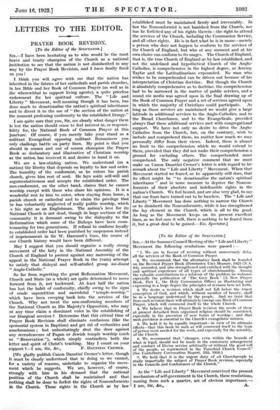[To the Editor of the SPECTATOR.]
SIR,-At the Summer Council Meeting of the " Life and Liberty" Movement the following resolutions were passed :— " 1. We are in favour of revising without unnecessary delay all the services of the Book of Common Prayer.
2. We recommend that the alternative book shall be founded on the Revised Prayer Book (Permissive Use) Measure, 1923 (N.A. 84), amended, and also strengthened and enriched with the thought and spiritual experience of all types of churchmanship. Among the valuable contributions to a solution of the problem we welcome• especially the publication of The Grey Book' (A New Prayer Book, Part I., the Holy Communion Office) as illustrating and expressing in a large degree the principles of revision here set forth. 8. We desire a revision which shall not fall below the truest conception of God, and which, without sacrifice of beauty, shall' be in a language understood by the people. And we trust, that from such revision there will ultimately emerge one Book of Common Prayer, which will commend itself to the whole Church.
4. We believe that in Prayer Book revision the needs of those at present detached from organized religion should be considered, especially in the provision of new forms of worship ; and that such provision is essential to the Church's evangelistic mission.
5. We hold it to be equally important—in view of its ultimata effects—that this book be such as will commend itself to the type of person most needed for the work, and especially for the ministry, of the Church.
8. We recommend that ' changes, even within the bounds of what is legal, should not be made in the customary arrangement and conduct of Divine service arbitrarily or without the good will of the people, as represented in the Parochial Church Council' (See Canterbury Convocation Report, 588, 1920.) I. We hold that it is the urgent duty of all Churchpeople to study impartially the subject of Prayer Book revision, especially in the Councils and Conferences of the Church."
As the " Life and Liberty" Movement conceived the present mechanism of self-government in the Church, these resolutions, coming from such a quarter, are of obvious importance.—






































 Previous page
Previous page